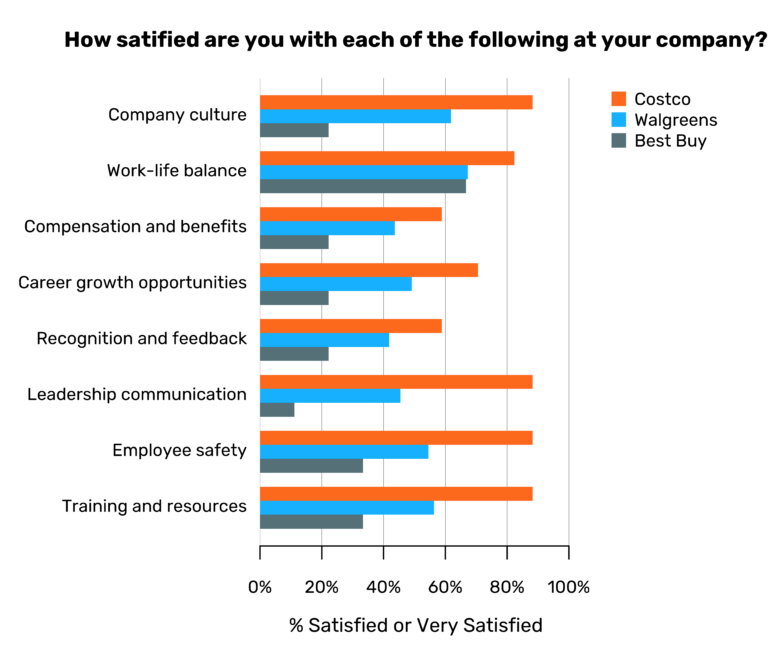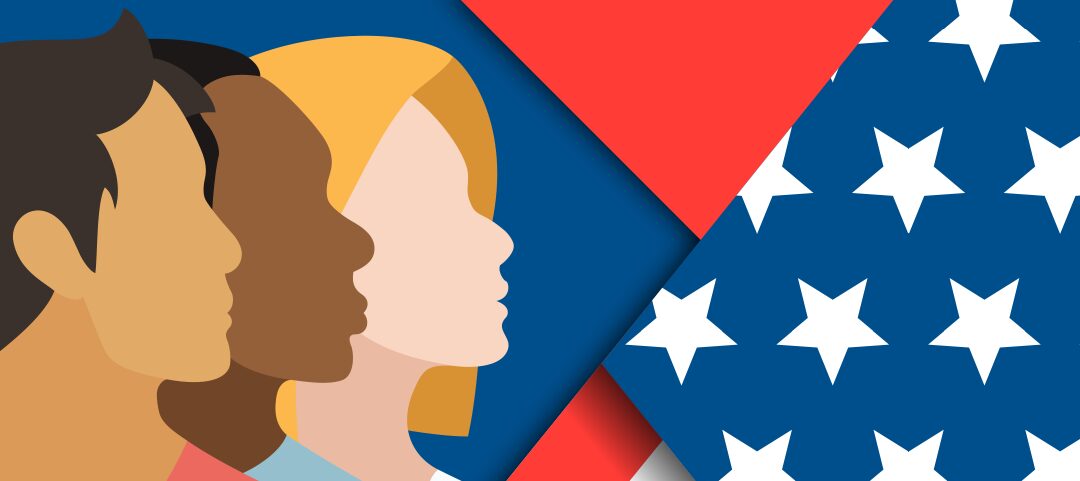Why Costco Outshines Competitors in Employee Satisfaction: A Deep Dive into Our Latest Survey

Employee satisfaction isn’t just a buzzword; it’s a critical measure of how retailers attract and retain talent in today’s competitive job market. At CloudResearch, we recently undertook a survey among employees of three big box retailers—Walmart, Best Buy, and Costco—to uncover why some workplaces excel in fostering happiness and engagement, while others lag behind. We used Engage, our AI-driven platform, to gather a mix of quantitative and qualitative data. The numbers speak volumes: Costco consistently outranked the other two retail giants in nearly every category, from company culture to compensation and benefits. Even more telling are the rich, personal stories that employees shared in one-on-one interviews. In this blog post, we’ll walk through the standout statistics and illustrate them with employee voices that highlight the reasons Costco employees report higher satisfaction.
The Numbers at a Glance
Before diving deeper, let’s examine the highlights of our survey data. Among Costco employees, 88% reported being satisfied with company culture, work-life balance, compensation, and training—an exceptionally high approval rate. Costco also led comfortably in recognition and feedback (71%), leadership communication (59%), and employee safety (82%). Walmart employees reported moderate satisfaction in some categories—56% for culture, 55% for work-life balance, 45% for compensation, and 62% for training. They were slightly more positive about employee safety at 67%. Best Buy employees, unfortunately, registered the lowest satisfaction rates: only 33% found the company culture satisfactory, 33% felt they had good work-life balance, and a stark 11% were satisfied with compensation and benefits.

These numbers reveal a fairly consistent story: while Costco employees express robust satisfaction across job dimensions, Walmart sits in a middle range (with occasional bright spots like training resources), and Best Buy lags behind in areas relating to growth, benefits, and culture. Yet, quantitative stats only scratch the surface. Our qualitative interviews with employees—conducted via Engage—offer an in-depth look at what truly sets the Costco employee experience apart.
A Culture of Care at Costco
One of the most powerful themes emerging from Costco interviews was the strong sense of employee care felt across departments and locations. An overwhelming 88% of Costco interviewees described an environment rooted in trust, empathetic management, and tangible recognition of work—a stark contrast to Walmart and Best Buy. Several employees repeatedly cited the company’s willingness to provide training, fairly compensate effort, and extend benefits that meet genuine needs.
For instance, one Costco employee spoke of how good leadership makes them feel secure in their position, explaining, “We got an email congratulating us on our work and letting us know about the bonuses we got. It made me feel safe within the company, more than anything–like I wasn’t going to just get dropped, and in the meantime, I was going to be looked after, as long as I did my part.” Another Costco interviewee was also appreciative of how flexible the company had been when personal issues surfaced, noting, “I was having a personal issue and I was allowed time off to sort it out.”
In the same vein, employees consistently emphasized that management’s sincerity shapes their perception of the workplace. One participant said, “it has been good, i feel like i have support from my managers and co workers” Another recalled managers stepping in to address employee health issues, describing a situation in which kidney stones demanded ongoing bathroom breaks but never prompted managerial anger or reprimand. Instead, they outlined how the company assisted and looked after them. This elevated sense of trust resonates across interviews, pointing to a leadership style that centers on respect for the individual.
Compensation and Recognition
Costco also stands out in compensation and recognition. An impressive 88% of employees expressed their satisfaction with pay and benefits, citing not just higher base wages but also consistent bonuses, pay bumps, and other incentives. One of the Costco employees who took part in our Engage interviews enthusiastically described the motivating power of bonuses, saying, “Once I started to understand that we could get bonuses like that, I performed better. It wasn’t just because I could possibly get paid more, but that I felt like my work meant something, and was recognized.”
Other participants credited Costco with providing competitive benefits that demonstrate genuine respect for employees’ time and financial stability. For instance, one employee noted, “i feel like it is fair as they go off performance… when i found out how much i could get it suprised me as it was more than any other job” A hallmark sentiment across multiple interviews was that such consistent recognition fuels a sense of security and belonging. Even employees who no longer see a managerial career path at Costco continue to speak positively about their experiences, especially compared to other retailers they have worked for in the past.
Walmart: The Mixed Middle Ground
Compared to Costco’s more universally positive reviews, Walmart’s employee satisfaction numbers lie somewhere in the middle. Company culture, work-life balance, and compensation each landed in the mid-40s to mid-50s range. However, employees seldom expressed as much overt positivity when describing how they felt about Walmart leadership or the everyday pressures they face. For example, one Walmart team member described a tense, high-pressure environment with minimal managerial support, saying, “Thousands of customers everyday to deal with complaints, return and more dispute. This is stressful and high pressure”
Another Walmart employee illustrated a lack of consistent scheduling: “You don’t have a set schedule, so it is hard to have a daily routine.” Many echoed these concerns, frequently describing management as “not effective,” or lamenting that repeated concerns fall on deaf ears: “I told management that more registers need to open during lunch hours because there’s always one or two open, and the lines are chaotic and hectic… managment said they’ll do something about, but never did.”
Although Walmart does sometimes provide bonuses or incentive pay, interviewees often felt they were insufficient in light of demanding workloads, or overshadowed by the stress of unclear policies. One participant recalled receiving a minimal year-end pay increase, stating, “Happened last year end got pay increase very less and felt like I need to look another job” In short, though some still appreciate Walmart as an “okay” job that pays the bills, many highlight structural issues around communication, pressure, and managerial responsiveness that hamper motivation.
Best Buy: A Struggle with Culture and Compensation
While Walmart employees often described a middling environment, Best Buy interviewees indicated more severe frustrations around culture, recognition, and career growth. Just 33% of Best Buy employees felt positively about their company culture, and only 11% were satisfied with compensation. One participant was blunt in describing the environment: “its not a bad job, i like helping people and doing the repair work… however, the company culture is awful, managers are awful, the corporatism that everyone goes on about is awful. there is a thousand thousand metrics and measurements that all mean nothing.”
The resulting feeling is often one of distrust or antagonism between management and employees. Another Best Buy worker described a time when reporting abusive manager behavior led to retaliation: “i had a manager threaten my job because i reported another lower manager for abuse.” These narratives convey a stressful environment where, in one especially alarming scenario, hours or pay may be docked without prior warning. Even customer service interactions can become fraught when employees feel they lack tangible support from their superiors. Interestingly, Best Buy did rate higher in employee safety (67%), matching Walmart’s safety figure—but across nearly every other measure, employees unanimously expressed crippling frustration.
Why the Differences? A Closer Look
One major question is how Costco manages to cultivate high satisfaction rates while Walmart and Best Buy struggle in key areas. Clearly, actionable differences emerge from our Engage interviews:
- Financial Security Through Bonus Structures: Costco employees repeatedly highlighted how the company invests in them with bonuses and robust benefits. Many felt stable and motivated. Meanwhile, Walmart interviewees mention the positive impact a bonus could have—yet emphasize how rarely they see meaningful increases. Best Buy employees express near-total disappointment with compensation.
- Training and Resource Allocation: 88% of Costco employees were satisfied with their training, describing ample opportunities to learn and refine their skills. In comparison, only 62% of Walmart employees felt good about training, and just 22% at Best Buy. Costco’s strong training approach, plus open communication channels, fosters an environment where employees know how to do their jobs and trust that they’ll be supported.
- Managerial Support and Communication: Many Costco quotes reference managers stepping up for employees, listening to concerns, and creating safe spaces. Walmart employees described hit-or-miss experiences, sometimes pointing to good local managers overshadowed by an unsupportive corporate structure. Best Buy accounts, however, often revolve around tension and scare tactics.
- Inclusive Culture vs. “Every Man for Himself”: Some of Walmart’s issues revolve around a sense of competition or “survival mode,” while Best Buy’s environment sometimes feels outright hostile. At Costco, by contrast, employees repeatedly mention a sense of solidarity and feeling valued.
Why Qualitative Insights Matter
It’s easy to see the big picture from the satisfaction percentages alone, but Engage helps us go a step further. Instead of raw numbers, our AI-driven approach to interviews digs into day-to-day experiences, providing a narrative dimension for issues like managerial style, scheduling policies, and communication breakdowns. We learn that employees satisfied with training might not just be praising a standard orientation packet—they may be highlighting real-time support systems, quick manager responses, and ongoing skill-building. The qualitative layer reveals how intangible factors, like a sense of security or shared values, lead to day-to-day positivity.
For example, an employee from Costco illustrated how acknowledging personal milestones and health issues fosters higher motivation: “My grandmother died in Costco gave me a week and a half for bereavement.” That single event, though not directly tied to wages or official policy, spelled a world of difference in how supported that individual felt. Contrast that with the reported experience of a Walmart associate who felt the need to come in despite having the flu to avoid termination. The compassion-based culture apparent in one environment is absent in the other.
About CloudResearch
CloudResearch is an online platform that connects researchers with more than 100 million research participants worldwide. CloudResearch provides tools to carry out complex online projects and polls for the academic, public, and private sectors. Engage is CloudResearch’s latest research innovation, using AI to combine the power of traditional and conversational surveys at scale cloudresearch.com.
Contact: Paul Connor, PhD, CloudResearch, Senior Research Analyst. paul.connor@cloudresearch.com
To provide more insight into what Engage is and how it works, below we include abridged transcripts from three interviews from each retailer.
Interview 1:
“It’s meant a lot to feel like someone who has value and is valued”
Interview 2:
"I just go there to do my job. Nothing more"
Interview 3:
"Almost every interaction with them lowers morale and job satisfaction"

